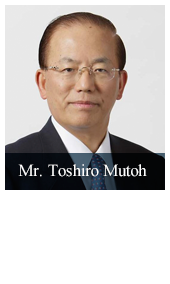 |
Mr. Mutoh spent over forty years working in the public sector and has been Chairman of DIR since 2008. Recently, Mr. Mutoh made the opening remarks at IMF and World Bank Group Annual Meetings 2012 held in Tokyo. Mr. Mutoh and DIR proposed the establishment of the Eastern Japan Great Earthquake Reconstruction Fund right after the earthquake on March 11, 2011.
Prior to Daiwa, Mr. Mutoh was Deputy Governor of the BOJ from 2003, and was engaged in the lifting of the zero-interest-rate monetary policy. He was appointed administrative vice minister of Finance in 2000, and was engaged in the planning and execution of the financial policy for successive cabinets.
Mr. Mutoh graduated from The University of Tokyo in 1966 with a bachelor's degree in Laws (LL.B.). |
Session 1
Special Lecture:
Can Japan Change? - Opportunities and Challenges Ahead - |
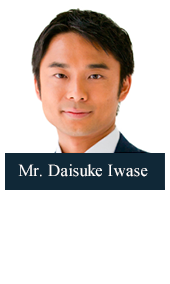 |
Mr. Iwase co-founded Lifenet Insurance Company in 2008 and assumed the current role in 2013. Lifenet Insurance Company is one of the most growing ventures targeted to revolutionalize Japan's 45 trillion yen life insurance industry by providing direct distribution of life insurance products via the internet. The company went public on the Tokyo Stock Exchange in March 2012.
Prior to co-founding Lifenet, Mr. Iwase started his career as a strategy consultant at The Boston Consulting Group and was engaged in private equity investing at Ripplewood Japan.
He was selected as a Young Global Leader by the World Economic Forum in 2010, and is an author of many best selling books in Japan, including "Seimeihoken no Karakuri (The Gimmicks of Life Insurance)".
Mr. Iwase is a graduate of The University of Tokyo (Law) and Harvard Business School (MBA with High Distinction).
|
Session 2
Can Japan Change? - From Entrepreneurs' Perspective - |
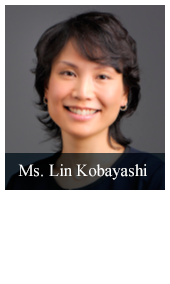 |
Ms. Kobayashi is the co-founder and Chair of the Board at International School of Asia, Karuizawa (ISAK), a residential high school that will be opening in Karuizawa in 2014. ISAK aims to bring together top students from around the world with the aim of developing leaders who are eager to work for positive change in their countries and communities.
Ms. Kobayashi spent two years working for the United Nations Children's Fund (UNICEF) in the Philippines, where she worked to program non-formal education projects for street children. Prior to UNICEF, Ms. Kobayashi worked at the Japan Bank for International Cooperation (JBIC).
Ms. Kobayashi began her career at a U.S. investment bank and holds an MA in International Education Policy Analysis from Stanford University and a BA in Development Economics from the University of Tokyo.
More recently, Ms. Kobayashi was honored with the title of "Young Global Leader 2012" by the World Economic Forum, and was selected as a "Changemaker of the Year 2013" by Nikkei Business, one of Japan's top business magazines. |
Session 2
Can Japan Change? - From Entrepreneurs' Perspective - |
 |
Mr. Shiozaki is a partner of Nagashima Ohno and Tsunematsu, one of Japan's leading law firms, practicing mainly in the fields of M&A, corporate governance and crisis management. He has represented both domestic and foreign clients in resolving major corporate crisis, including the recent Olympus scandal, and served as a core staff for the Independent Investigation Commission on the Fukushima Nuclear Accident.
Mr. Shiozaki worked in the Prime Minister's office as senior policy advisor from 2006 to 2007, and currently serves on the advisor board for the "Jump Start NIPPON" project led by METI to promote entrepreneurship in Japan.
Mr. Shiozaki is a graduate of University of Tokyo (Law), Stanford University (MA, International Policy), and the Wharton School of the University of Pennsylvania (MBA).
Mr. Shiozaki co-authored "Japan's Worst Case Scenario - Nine Blind Spots" (2013), "Mistakes and Lessons from the DPJ Administration" (2013) and many other articles.
|
Session 2
Can Japan Change? - From Entrepreneurs' Perspective - |
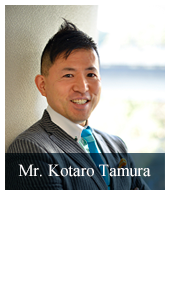 |
Mr. Kotaro Tamura was a commander of Abenomics 1.0 six years ago. He was two term senator in Japanfs Diet and parliamentary secretary for cabinet office in charge of economic and fiscal policy in Japan during first Abe administration in 2006-2007. He was a senior fellow at Yale University, RAND Corporation and a research associate at Harvard University.
During his public service, Mr. Tamura was also chairman of Japan's Ministry of Land, Infrastructure, Transport and Tourism. He is an advocate and principal initiator of establishing a sovereign wealth fund for Japan. Before entering politics, he was an investment banker and CEO of the Osaka Daily News, leading daily paper in the second largest city in Japan.
Mr. Tamura serves as senior advisor to the China Europe International Business School and is an honorary associate at the National University of Singapore.
Mr. Tamura received a bachelor's degree at Waseda University, an M.B.A. from Keio University, a J.D. from the Duke University School of Law, and master's in economics from Yale and the Fletcher School at Tufts University. He also completed advanced management studies at the University of Oxford and Executive Management Program at University of Tokyo.
|
Session 2
Can Japan Change? - From Entrepreneurs' Perspective - |
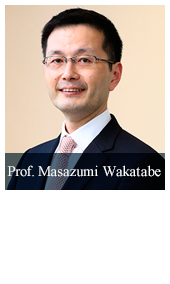 |
Graduated from Waseda University, and studied at the University of Toronto, recently Mr. Wakatabe has been working mainly on the history of economic thought and economic history during economic crises. He was a Visiting Fellow at the University of Cambridge, the James Buchanan Center for Political Economy, George Mason University, and the Center on Japanese Economy and Business, Columbia University. He has been a Professor of Economics, Faculty of Political Science and Economics, Waseda University, since 2005.
Especially, Mr. Wakatabe has been known as a "reflationist" in Japan, an expert on the monetary policy of the Bank of Japan and "Abenomics." He has regularly contributed to the Nihon Keizai Shimbun (Japan Economic Journal), and other media. His books include Economists' Battles (2003) The Showa Depression (edited by Kikuo Iwata, 2004: awarded the Nikkei Prize in Excellent Book in Economics), The Economics of Reform (2005), Economic Crises and Policy Responses (2009). Recently he has published The Anatomy of Abenomics (2013). He also co-wrote with Koichi Hamada, Professor Emeritus of Economics at Yale University and a close adviser to Prime Minister Shizo Abe, and Professor Kikuo Iwata. |
Session 3
Can Japan Change? - From Academic Perspective - |
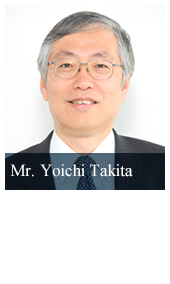 |
Mr. Takita is a senior staff writer at Nikkei, a global media organization focusing on business and economic news. In 1981, He joined Nikkei (former Nihon Keizai Shimbum, Inc.) as a staff writer covering financial markets. He served as Zurich Bureau Chief (1987-90), as a senior staff writer in Economic News Department (1995), and as Deputy Chief Editorial Writer for Nikkei (2007). He was also a senior staff writer for Nikkei America in NY covering the US economy (2008-9). He returned to Tokyo and worked as Deputy Chief Editorial Writer for Nikkei (2009-11).
Mr. Takita won the Vaughan-Ueda International Journalist Award in 2008. He is the author of Opening Pandora Box (2008) and How to Read the Currency Market, 4th edition (2010).
Mr. Takita holds a Masterfs degree in Law from Keio University.
|
Session 3
Can Japan Change? - From Academic Perspective - |
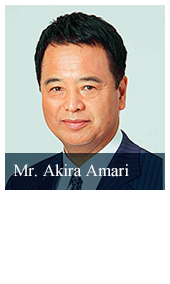 |
1989, Parliamentary Vice-Minister, International Trade and Industry; 1993, Director, International Trade and Industry Division, Liberal Democratic Party (LDP); 1995, Chairman, Committee on Commerce and Industry, HR; 1998, Minister of Labour (Obuchi Cabinet); 2000, Chairman, Finance Committee, LDP; 2000, Chairman, Research Commission on Small and Medium-Sized Enterprises, LDP; 2004, Chairman, Committee on Budget, the House of Representatives; 2005, Acting Chairman, Policy Research Council, LDP; 2006, Minister of Economy, Trade and Industry (Abe Cabinet); 2008, Minister of State for Regulatory Reform; 2012, Chairman, Policy Research Council (LDP). Since December 2012, Minister for Economic Revitalization, Minister for Total Reform of Social Security and Tax, Minister for Economic and Fiscal Policy.
In 1983, Mr. Amari was first elected to the House of Representatives, since then re-elected ten times.
Mr. Amari graduated from Department of Law, Keio University. |
Session 4
Keynote Speech:
Abenomics -Japan Can Change- |
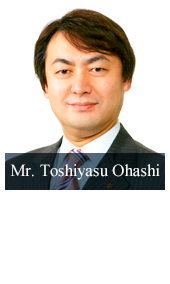 |
Mr. Ohashi began his career at International Consulting Dept., Daiwa Institute of Research Ltd. (1996-2001), and Cooperate Strategic Advisory Dept., Daiwa Institute of Research Ltd. (2001-2003). He became Head of Credit Research, Fixed Income, Currency and Commodities (FICC) Research Dept., Daiwa Securities SMBC Co. Ltd. (2003-2009)
Mr. Ohashi hold a Bachelor of Engineering from Waseda University. He also hold Master of Public and International Affairs, University of Pittsburgh, and Master of Engineering from Waseda University.
|
Session 5
Can Abenomics Change Japanese Credit Market? |
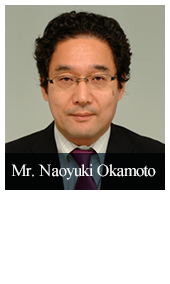 |
Mr. Naoyuki Okamoto joined the Ministry of Finance in April 1985. He assumed the Director of the Itako tax office, Ibaraki Prefecture in July 1990. Thereafter, he worked in Swiss as a Director in the Zurich office of Japan External Trade Organization (JETRO) for 3 years, and he worked the Budget Bureau of the ministry as Budget Examiner, and the following year, he worked at the Cabinet Secretary as Director.
In July 2013, he became the Deputy Director General (Government Finance, Treasury and Currency), the current position.
|
Session 6
Japanese Economy and Debt Management |
|

